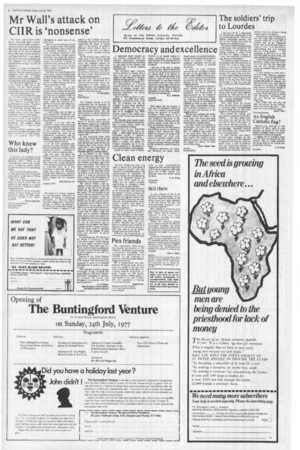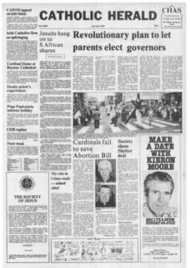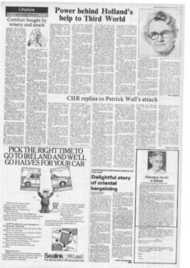Page 4, 22nd July 1977
Page 4

Report an error
Noticed an error on this page?If you've noticed an error in this article please click here to report it.
Tags
Share
Related articles
Ciir Replies To Patrick Wall's Attack Mr Patrick Wall, In
Ciir Replies
Time For A Long Hard Look At What The Catholic Institute...
Letters To The Editor
The Causes That Ciir Does Not Campaign For
Mr Wall's attack on CIIR is 'nonsense'
For some years I have worked in close and daily contact with the staff of CUR, and served on several of its committees. One does not have to be far to the Left to be left of Patrick Wall, MP (July 15) but from my privileged position I can assure him that I have never picked up the slightest hint of a Soviet sympathiser among its staff or advisors.
Some. it is true, are Socialists; others are Conservatives or Liberals. The one common bond is sympathy with the underdog, whether white, black, or yellow, and hostility towards systems which are destructive of human dignity. Its ideological inspiration is not to be found in Marx but in the Gospel, and the Third Synod's declaration that concern for international justice is a constitutive part orChristian faith and practice.
And its conviction that the surest way of discrediting Communist oppression is to challenge injustice in the Western world also has a good Gospel precedent: "First consider the beam in your own eye". No doubt the institute itself will explain, not for the first time — though Patrick Wall's ears remain stubbornly closed to the answer — why CUR concentrates its attention on certain areas of the world of which it has special knowledge and experience, and neglects others concerning which it has no such competence.
But the criteria it employs could and would be employed against any form of political or social oppression no matter what the
Who knew this lady?
1 would be very grateful for any information concerning Miss Emily Bowring (1833 1870) on the following data: before her conversion to Catholicism (1853); before her leaving England for Hong Kong (1854). She tollowed her father there — Sir John Bowring (1792-1872) on his appointment as Governor of Hong Kong (1854 1859).
Miss Emily Bowring joined our Order in Hong Kong in 1860. The motive of this appeal is to obtain basic facts for a biography of Sister Aloysia Bowring.
Information could be forwarded directly to Hong Kong or to the Canossian Sisters, 69 Park Way, Welwyn Garden City, Hertfordshire.
(Sister) Lino Elva The Canossian Sisters, 26 Caine Road, Hong Kong.
ideological or racial !RIO of the guilty party.
There is not the remotest ground for his assertion that CIIR applies double standards, turns a blind eye to Left-wing oppression, or has some sneaking sympathy with terrorist atrocities; though painful experience has taught the institute to be wary of highly-publicised accounts of terrorist outrages in Southern Africa which have on occasion turned out to be cleverly stage-managed propaganda exercises by governments. That does not mean that guerrilla forces never commit outrages (that could not have been claimed during the Second World War even for the British Army) but Patrick Wall would be well-advised to check his facts as carefully as CUR. Which brings me to the "Comment" pamplets. I have every reason to know what immense care is taken to make these as accurate and objective as possible within the limits of human fallibility. They go through several recensions, and come under the scrutiny of a number of experts in the subject under discussion who could not possibly be united in some Leftwing conspiracy.
I would judge that at least as many provisional "Comments" are rejected because they do not meet the rigorous standards set, as arc in fact published. Finally, I do not find the "Catholic" in the CI1R's title in the least embarrassing. I believe it to be one of the Church's greatest assets in this country, not least as demonstrating the value of lay professional competence and initiative in bringing home to the Catholic community the ideals of the Second Vatican Council.
I am far more personally embarrassed by those "Catholic' MPs who are on the extreme Right of the Conservative Party -mavericks in political as wen as religious terms. My own hope and desire for CUR is not that it should be less "Catholic" but more truly "international". Ii will be a welcome day when funds and a larger staff allow it to build up continent by continent an expertise such as it has developed in particular regions. It would thus serve the worldwide Church more effectively, and have a better chance of exposing Patrick Wall's charges for the nonsense they are.
John Harriott, SJ London, NW I .
No doubt the Catholic Institute for International Relations is capable of making a convincing refutation of Patrick Wall's scurrilous allegations in his article of June 15 without my assistance. Mr Wall has consistently fought a rearguard action in support of all regimes of the far Right and. to my knowledge, has never once publicly condemned the abuse of human rights or the torture of political prisoners which without doubt is practised as the norm in at least a dozen countries lurching towards fascism.
On the contrary, one could fill an entire issue of the Catholic Herald with documentation of Mr Wall's active and organised support for such regimes. Small wonder, then, that many of the most courageous dissidents in Eastern Europe regard the favour of Mr Wall and his ilk as the kiss of death. With friends like this, who needs enemies?
Patrick Wall, MP, is one of many who put their commitment to a rabid anti-Communism before any commitment to truth, justice or human decency. I'm surprised that a paper such as yours should give space to a man such as this.
vi, Broughton Wick, Near Bristol.
The Catholic Herald is to be commended for its decision to provide a forum for a discussion of the role of the Church in national and international affairs. The role of the Church as a factor of peace in the community is of the utmost importance. Whatever the arguments in favour of Catholic peace groups, the essence of peace is co-operation with others. The problem of peace was the subject of the encyclical letter of Pope John XXIII Pacem Ia Terris (1963) addressed to "all men of good will". In this encyclical Pope John praised the United Nations for its achievements and expressed the wish that the day would not be long delayed when every human being could find in this organisation an effective safeguard for their inalienable rights as a human person. In his address to the United Nations General Assembly on October 4, 1965, Pope Paul said: "We are convinced that this is the path that modern civilisation and world peace must follow. The edifice you have constructed must never be allowed to collapse in ruins; it must be adapted to the demands which the history of the world will make upon it; it must be perfected and mark a stage in the development of humanity. From now on there is no going back, you must go forward." The United Nations was established by the adoption of the UN Charter at the end of the Second World War. The Charter opens with the words; "We the peoples of the United Nations determined to save succeeding, generations from the scourge of war, which twice in our lifetime has brought untold sorrow to mankind, and to reaffirm faith in fundamental human rights, in the dignity and worth of the human person, in the equal rights of men and women and of nations large and small, and to establish conditions under which justice and respect for the obligations arising from treaties and other sources of international law can be maintained, and to promote social progress and better standards of life in larger freedom, and for these ends to practice tolerance and live together in peace with one another as good neighbours."
In submitting the UN Charter to the House of Commons in 1945 Ernest Bevin urged: "If this Charter is to have vigour and life it is not governments alone that must act. There must be behind it parliaments and what is more important organised public opinion, to see that it is _made to work."
Support for the United Nations ought to be a fundamental concern of the Church. The UN needs to be supported. It needs to be criticised and Improved. It needs to be made to work.
UNA branches would be greatly encouraged if they received the moral support of the local Catholic community expressing in practice its concern, for peace and willingness to co-operate with "all men of good will."
G. F. Walker Hon Secretary, United Nations Association Leicester Branch
Leicester, .
blog comments powered by Disqus









